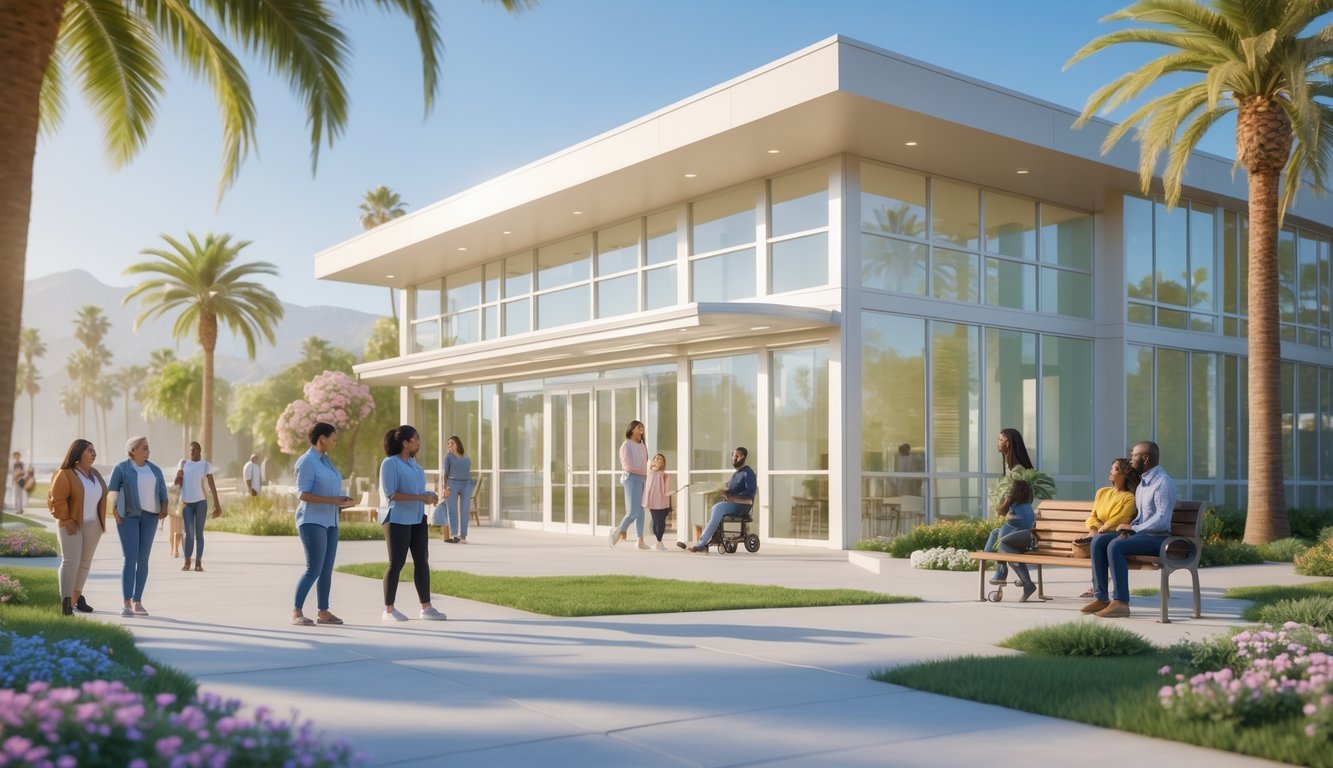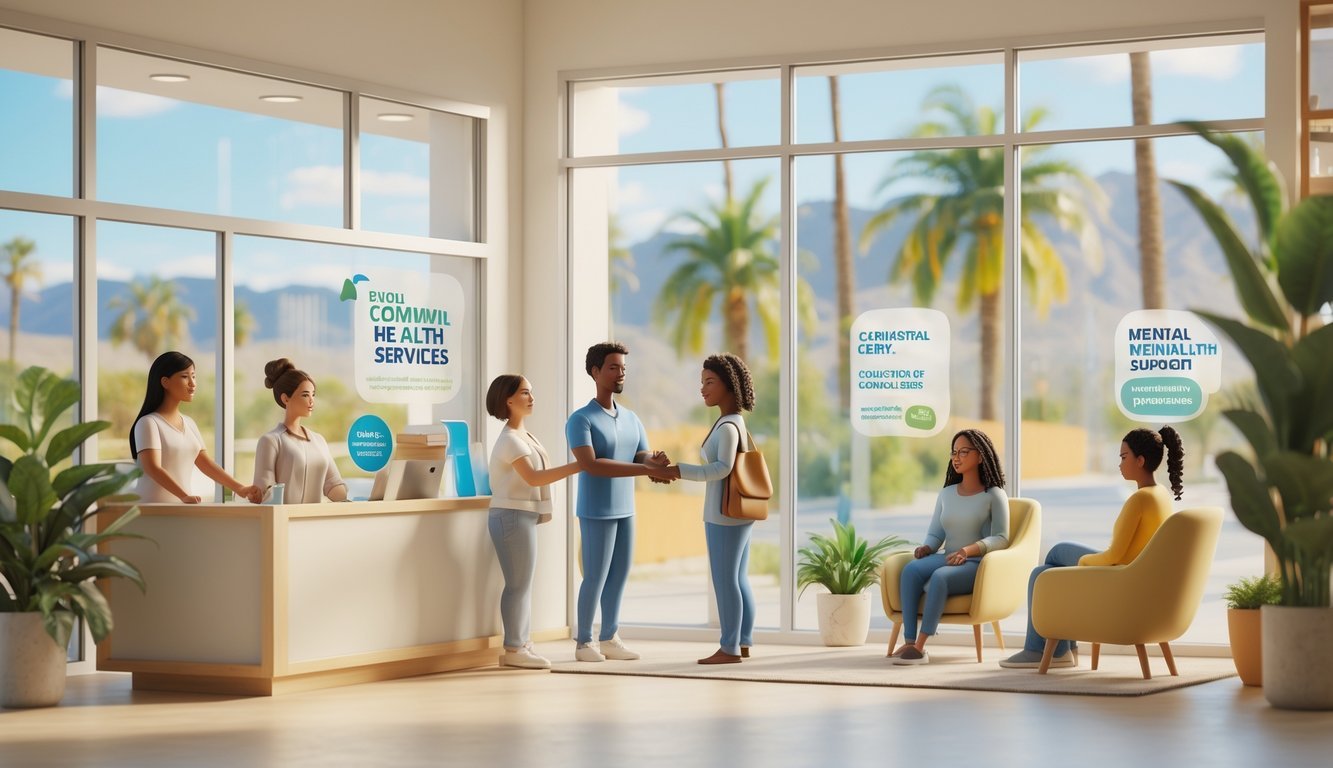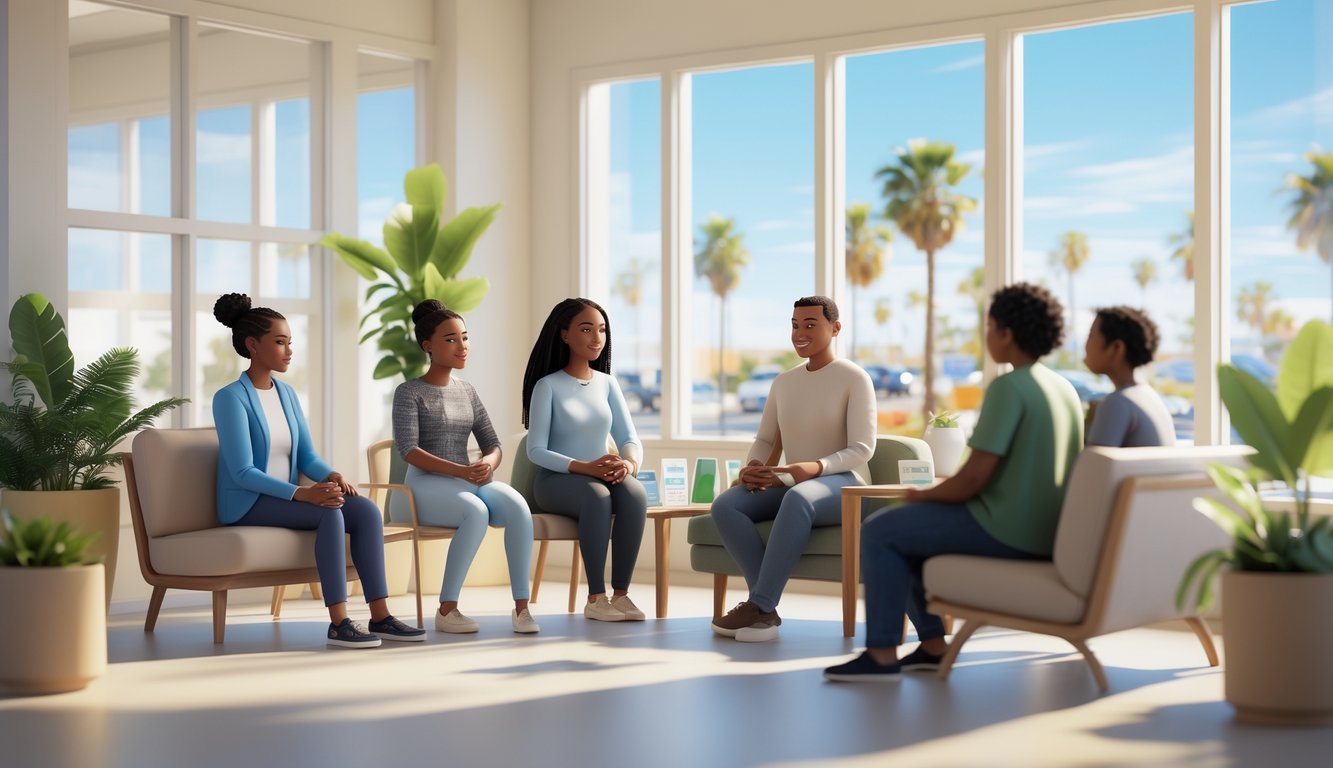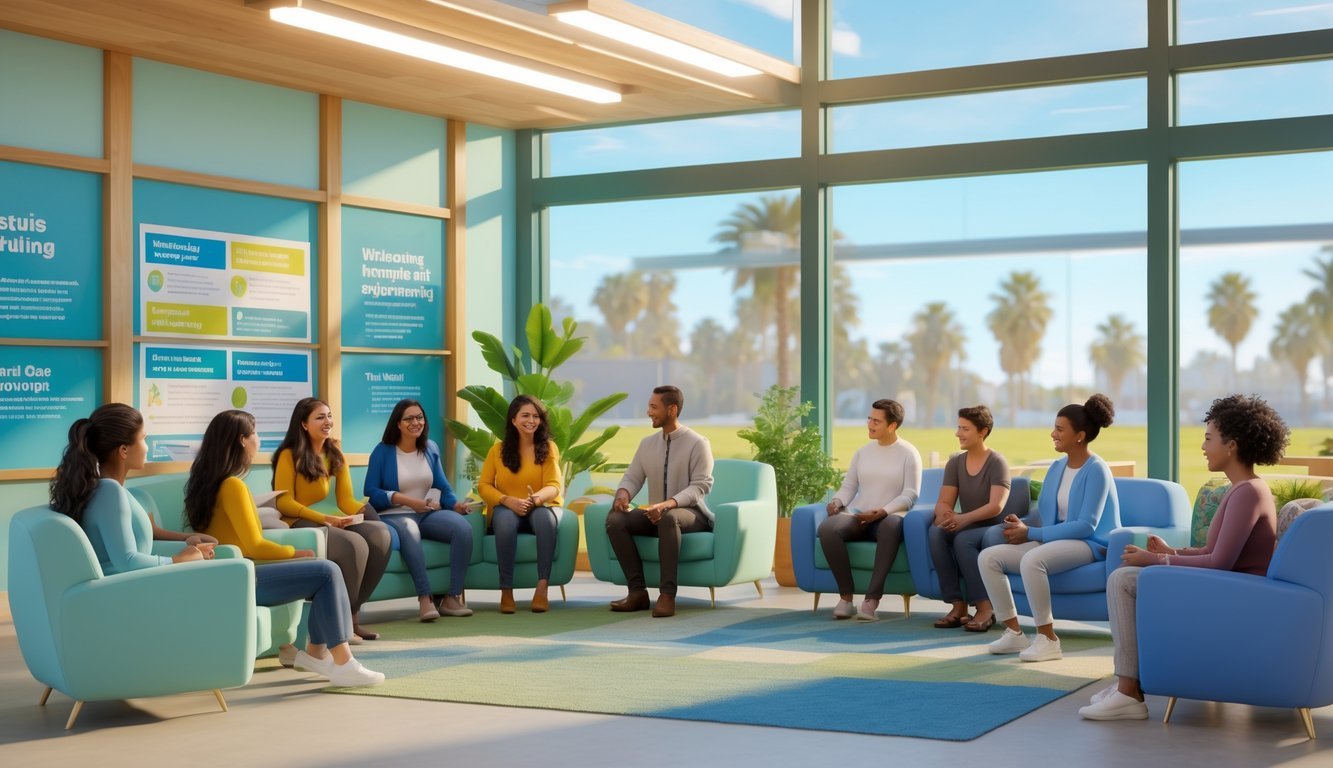PsychNewsDaily Publishers
100 Summit Drive
Burlington, MA, 01803
Telephone: (320) 349-2484
PsychNewsDaily Publishers
100 Summit Drive
Burlington, MA, 01803
Telephone: (320) 349-2484
California offers extensive free mental health services, including crisis hotlines, therapy, and support programs, accessible through county programs, community clinics, and state-funded facilities.

California has a wide range of free mental health services for residents who need support but can’t afford private care. You’ll find everything from crisis hotlines and emergency help to therapy and special treatment programs.

You can get free mental health care through county programs, university health centers, community clinics, and state-funded facilities across California. The San Diego Crisis Line at 888-724-7240 offers confidential, free support for people in urgent need.
Many programs focus on specific groups or conditions to make sure you get the right help.
Trying to find the right mental health services can feel like a lot, especially when you’re already having a hard time. This guide breaks down your options for free care, from emergency support to long-term programs, and points you to statewide resources that can help you figure out the system.

To get free mental health care in California, you’ll need to know if you’re eligible, find the right providers, and understand how to get started. County programs, community health centers, and crisis centers all offer services.
Most free mental health services in California use income levels to decide if you qualify. If your household income is under 200% of the federal poverty level, you’ll usually be eligible.
Income Limits for 2025:
Medi-Cal covers the most people for free mental health care. You can apply if you meet the income rules, are pregnant, disabled, or under 21.
County mental health programs often help people no matter their insurance status. They focus on those with serious mental illness or people in crisis.
You might need:
Some community health centers use sliding fee scales, so you pay what you can afford. Many services are totally free if your income is very low.
Every California county runs its own mental health department. These departments give direct services and keep lists of local providers who take uninsured patients.
Start by calling your county social services office. Staff can connect you with mental health services nearby and help with applications.
How to find providers:
Federally Qualified Health Centers (FQHCs) are in most California cities. They have to offer mental health services on a sliding fee scale based on your income.
Plenty of religious groups and nonprofits offer free counseling, often with less paperwork and shorter wait times.
Good questions for providers:
Sometimes you need help right away. California has several ways to get urgent mental health care without waiting for an appointment.
Call 988 for the national suicide and crisis lifeline. You’ll get connected to local counselors who can give immediate support and help you find services close by.
Hospitals often have psychiatric emergency services. These teams can assess mental health crises and set you up with ongoing free care in your area.
Where to get immediate help:
UC San Diego Health gives 24/7 emergency mental health services and has a crisis line at 888-724-7240 for confidential support.
Some places have behavioral health crisis centers with short-term psychiatric services and connections to longer-term care, no appointment needed.
County mental health departments often send crisis teams to your home, work, or wherever you are during emergencies. These teams check your situation and arrange the right services.
You should seek help right away if you have:

California has free mental health crisis services available 24/7. You can get immediate help through hotlines, counseling, and suicide prevention programs if you’re in a mental health emergency.
988 is the main national crisis hotline. Call it for immediate mental health emergencies. You’ll reach trained counselors who offer free, confidential support any time.
The San Diego Crisis Line at 888-724-7240 gives extra local support. Many counties have their own crisis lines staffed by people who know local resources.
Trans Lifeline offers crisis support at 877-565-8860, serving transgender people during crisis situations.
You can text HOME to 741741 to reach the Crisis Text Line. This connects you with trained counselors by text.
Most crisis lines provide:
California has special programs for suicide prevention. The 988 hotline is focused on suicide crisis intervention.
Warning signs you should never ignore:
If you’re thinking of harming yourself, go to the nearest emergency room. Hospital ERs can give you a psychiatric evaluation and make a safety plan.
Many hospitals in California have suicide prevention programs. They offer safety planning, medication checks, and connections to ongoing care.
Crisis counseling gives short-term support during mental health emergencies. UC San Diego Health provides full psychiatric evaluations and crisis intervention.
Walk-in crisis centers are open across California. You don’t need an appointment, and you’ll get assessed, stabilized, and referred to more care if needed.
Case managers help students and adults handle crisis situations. They connect you to local resources and help make action plans for recovery.
Crisis counseling often includes:
Most of these services take Medi-Cal and help you whether you can pay or not.

California has mental health programs for specific communities and age groups. These services address the unique needs of youth, LGBTQ+ folks, families, and vulnerable people with care that respects their backgrounds and experiences.
Young people often need different mental health care than adults. California’s county mental health departments and community groups run programs just for youth.
Many programs focus on early help for depression, anxiety, and trauma. Crisis support is available 24/7 with youth hotlines and mobile teams.
Schools often have mental health services so students can talk to counselors or therapists right where they are. This helps break down barriers to care during those tough growing years.
Transition-age youth (16-25) get special support that covers mental health and life skills. Services include job training, education help, and support for living on their own.
Peer support programs match young people with others who’ve been through similar things. These groups offer emotional support and real-life coping tips in a safe space.
LGBTQ+ people often deal with higher rates of mental health issues because of discrimination and rejection. California funds programs that offer affirming care and support.
Trans Lifeline gives crisis support just for transgender folks. Trans volunteers staff this hotline and understand what it’s like to face gender identity challenges.
Counties offer LGBTQ+-affirming therapy with trained mental health providers. These professionals know about coming out, family rejection, and gender dysphoria.
Support groups meet in community centers and LGBTQ+ organizations. They talk about relationships, workplace issues, and family acceptance.
Youth programs for LGBTQ+ teens and young adults include counseling, peer support, and family mediation to help everyone communicate better.
Mental health struggles can impact whole families. California offers programs that help both parents and kids with a family-first approach.
Parent education classes teach caregivers to spot mental health warning signs in their children. These classes also give tips for supporting recovery at home.
Family support services help caregivers understand mental health conditions and when to get professional help. There are educational materials and support groups available.
Wraparound services bring together schools, health care, and community organizations to make sure families get support from all sides.
Crisis teams can respond to family emergencies at home and provide stabilization services.
Parenting support groups let caregivers talk to others in similar situations. It helps to know you’re not alone and to get advice for everyday challenges.
Kids in foster care face much higher mental health risks. California has trauma-informed care programs for these youth.
Therapeutic foster care programs train foster parents to care for children with serious mental health needs. These placements offer stability and professional support.
Homeless people get mental health help through outreach programs and drop-in centers. These teams meet people where they are and offer immediate support.
Trauma-focused therapy helps abuse survivors and kids who’ve had many placements. These therapies are designed for complex trauma.
Mental health providers working with vulnerable groups receive extra training in trauma-informed care. They understand how past trauma shapes current mental health.
Case management services connect people with housing, benefits, and ongoing mental health care. Coordinated support makes a real difference and can prevent future crises.
California supports mental health through state departments, community organizations, and education programs. These groups offer direct services, workforce training, and more across the state.
The California Department of Health Care Services leads the state’s behavioral health transformation. This includes putting Proposition 1 and the Behavioral Health Services Act into action to improve access.
You can get help through California’s Mental Health for All Initiative. The Department of Health Care Access and Information started two new behavioral health programs to grow the Medi-Cal mental health workforce.
These programs offer:
The state works on removing barriers for homeless people with mental illness. They’re aiming for faster intakes and more residential options.
Community organizations across California fill in the gaps where services are limited, especially in rural or underserved places.
Many nonprofits offer crisis intervention. You can call the San Diego Crisis Line at 888-724-7240 for free, confidential support anywhere in California.
Community mental health centers provide:
These organizations team up with state agencies to expand behavioral health care for older adults in local communities. They often get funding from Proposition 1 and other state programs.
Many schools and organizations now offer free resources for mental health training and support. Stanford Medicine shares science-based materials that help mental health providers build their skills.
You can check out free online courses about health and medicine. These classes can teach you more about mental health awareness and ways to support others.
Some training options you might find include:
Support groups gather in different communities all over the state. They usually focus on topics like depression, anxiety, trauma, or substance use.